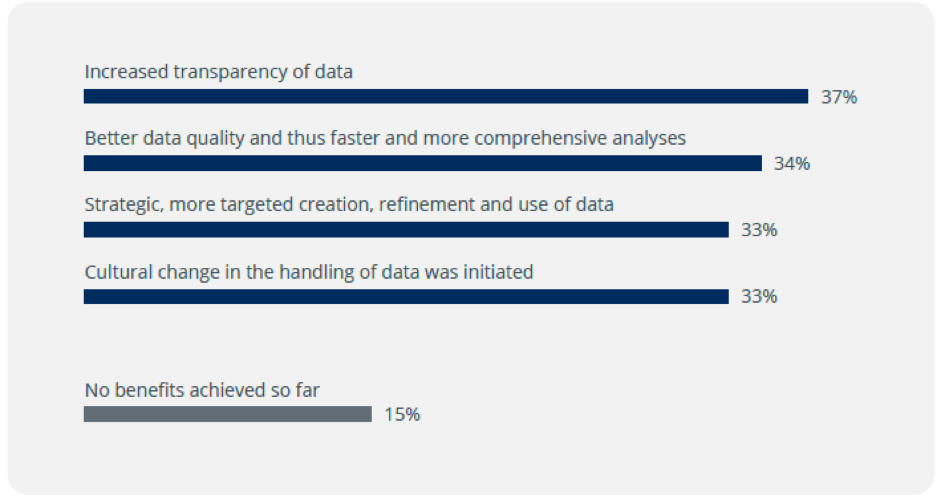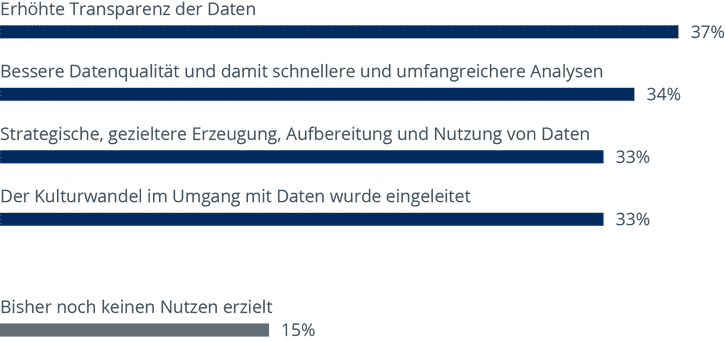Companies Need To Take Data Handling To The Next Level
BARC survey “Leverage your data – a data strategy checklist for the journey to the data-driven enterprise” published
- The majority of companies believe that data deserves significantly more attention
- Effective approaches to improving data handling are known, but rarely applied
- The benefits of more effective use of data are only gradually emerging
BARC (Business Application Research Center) today published the results of its topical survey “Leverage your data – a data strategy checklist for the journey to the data-driven enterprise”. In the study, BARC analysts Jacqueline Bloemen and Timm Grosser take a close look at how companies are currently handling data and the hurdles along the way to becoming a data-driven enterprise. The full study is available for download free of charge thanks to sponsorship by Ab Initio, Alation, Collibra, Cubeware, Denodo, Tableau and Talend.
Data deserves greater attention
According to a new BARC survey, companies agree that they could benefit from giving data more attention. 90% of participants point out that information has a high priority in decision-making. Almost the same proportion (87%) state that they could improve their corporate results by optimizing data handling. However, the real value of data is often not transparent enough. Decision-makers in particular have little insight into their data-related problems and the benefits of potential investment. “If companies do not have knowledge of the quality and usability of their data, of course they will find it difficult to assess the value and potential of their data,” said Jacqueline Bloemen, Senior Analyst Data & Analytics at BARC and co-author of this study.
The study shows that companies are groping in the dark, especially when it comes to data-related processes. 66% of participants state that they waste a lot of time asking the same questions about data or repeating work. Also, it is often unclear who is using what data and for what purpose (61%). Surprisingly, the measures to effectively deal with these challenges seem to be quite clear to most of the companies surveyed. They are aware that more information about their data is needed (59%) and clear responsibilities have to be defined (57%). Nevertheless, when it comes to actually implementing these approaches, most companies have not put their theory into practice yet (see Figure 1).

It is clear that companies face major hurdles when it comes to implementing new data handling approaches. 52% of participants point out that there is a lack of documentation and knowledge about data. to start. Another issue is that the operational business is prioritized over driving innovation through data (43%) and holding people accountable for handling data (40%).
Companies are not in a situation to benefit significantly from their use of data (yet)
The study shows that companies are currently struggling to gain and maintain an overview of their data. Approaches to improve the situation are known but are proving difficult to carry out in practice. Against this background, it is not surprising that the benefits achieved so far are rather limited (see Figure 2)

None of the benefits listed have been achieved by the majority of survey participants (the highest rating is 37%). A look at best-in-class companies in comparison to laggard companies reveals what could be done better: While both groups are investing in enabling more self-service analysis and providing more information about data, best-in-class companies are doing this more intensively (42 and 38 percent respectively, versus 25 and 24 percent for laggards). For best-in-class companies, further areas of focused investment include defining clear responsibilities/points of contact for data utilization and providing a business glossary.
These measures also foster multidisciplinary collaboration in the utilization of data. While both groups achieve the same ratings for “development of the corporate data culture from “need to know” to “right to know”“ (23 percent), from a relative perspective this point is more important for laggards (third highest rating). In contrast, best-in-class companies invest more in targeting definition and priority steering by senior management (21 percent) than laggards (10 percent). Best-in-class companies are also more likely to invest in data literacy by carrying out targeted staff development and training to promote data and analytics skills (31 percent versus 10 percent for laggards).
“On the bottom line, the message is clear,” said Timm Grosser, Senior Analyst Data & Analytics at BARC and co-author of this study. “Treating data as an asset and collaborating on a multidisciplinary basis requires targeted steering and corresponding processes. This cannot be achieved with a bottom-up approach only. Enabling a data-driven enterprise affects every employee and requires a fundamental cultural change. Executives must want, initiate and actively promote this change.”
About The Survey
“Leverage Your Data – a data strategy checklist for the journey to the data-driven enterprise ” is a topical BARC survey dealing with companies’ approaches and challenges when seeking to improve their use of data. The study is based on a worldwide survey of more than 400 companies from various industries and of different sizes. The focus of the study is to evaluate what companies are currently doing to reap the potential of their data and to give recommendations for more effective ways of handling data. The authors of the study are Jacqueline Bloemen and Timm Grosser, Senior Analysts for Data & Analytics at BARC. Here you can view the infographic and download the survey free of charge.
